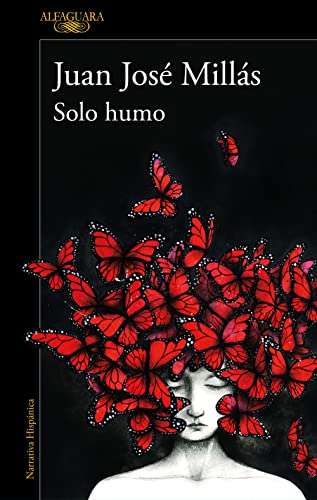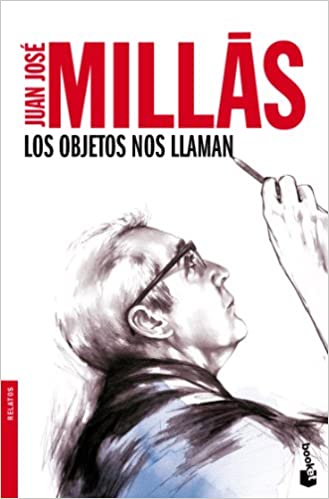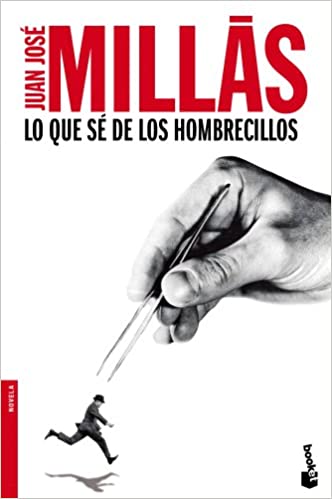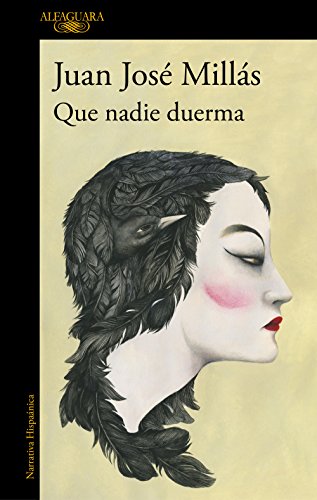Who else who least knows something about the life and work of the writer Juan José Millas. Because beyond his extensive literary career, this author thrives as a columnist and radio commentator, where he performs perfectly. Because, although it may seem contradictory in the literary world, mastering the spoken language is not always a virtue of writers, who look like fish out of water or who are driven by a supposed intellectual superiority, or who do not make humor their daily tool... a thousand and one a reasons.
And the truth is that, reading to Juan Jose Millás, among his creative wealth, which can already be guessed in his practically autobiographical book My true story, it is not suspected that you can meet a loquacious type because his prose can cover everything with enough profusion to not have more to tell. His approaches go rather from the outside in, from the world and how it is synthesized inside once the senses have been traversed.
Ramblings aside, I'll get on with my list of 3 essential novels by Juan José Millas that deserve to occupy my particular Olympus. Although in the case of authors capable of sophistication as a background from thematic transparency, tastes can be very diverse...
Top 3 recommended novels by Juan José Millás…
Loneliness was this
A very successful title to consider many things that later the knot of the story deals with. What is loneliness when we are happy? Do we ignore it or deliberately push it away until it reaches us?
Loneliness is the absence of people that fill your life. Loneliness is a telephone where no one answers anymore, or a house without voices, or a bed without shared breaths. Loneliness manifests itself crudely to us, rational beings incapable of understanding what no longer exists forever, this always being a deadline set for us as well.
A wonderful exercise in introspection through a woman who has reached that moment of unanswered questions in a changing social environment, who does not wait for anyone. But perhaps those moments are conducive to discarding what is left over from your life. Already put, knowing the sadness you can continue pointing out and setting aside what makes you unhappy.
Loneliness was this is the story of a woman who begins, after the death of her mother, a slow metamorphosis towards liberation through a painful apprenticeship. The increasingly humanized gaze of a detective and the progressive estrangement of her husband will be essential elements of this path of perfection.
Endowed with a narrative talent that knows how to make the everyday the beginning of the anguish, Juan José Millás offers us a torn chronicle of today's life, where there is no lack of a reflection of the attitudes of those who, after a leftist militancy, have replaced ideology for the credit card.
just smoke
The old silences, unrecoverable to load them with the words that could serve as a placebo. In the same way as in Big Fish, that great Tim Burton film, Carlos, the son, rediscovers the father with whom everything was once a disagreement. And on this occasion there is also a saving reunion. Although everything happens in a less opportune way to heal wounds because the father is no longer there, but his writings remain and a way of seeing the world from new transformative potentialities for Carlos.
On the day he turns eighteen, Carlos receives a strange gift: the news that his father, whom he never knew, has died and has left him a house with everything in it and an unknown life to peek into. Examining the vestiges of that abruptly interrupted existence, he finds a manuscript that tells a story of secret love, of a girl and a butterfly, of friendship and of death. Is it a real confession or a fiction?
Carlos, who is about to begin his studies in Business Administration and Management, realizes that his father was a voracious reader. In the bedroom of that house that little by little he is making his own, next to the bed, he discovers a book that captivates him: the tales of the Grimm brothers. The boy immerses himself in reading these stories and at the same time begins a vital process that brings him closer and closer to his father and teaches him how to navigate those invisible borders that separate reality from fantasy and the sanity of The madness.
In this deceptively light novel, Juan José Millás returns to some of the most representative themes of his narrative, such as identity, splitting, the darkest recesses of everyday reality —those in which the extraordinary is hidden— and fatherhood, while composing a hymn to the imagination and the transforming power of literature.
Objects call us
The impulse to write a story is born from an idea that begs to get out. The writing of a story is an onanistic satisfaction of every author.
A set of stories is an evocation of all those singular moments that conclude with ideas on paper. When you discover that there is a certain thematic unity between all of them, you consider that you have really lived a serial novel in your own creative mind ...
A box of matches that illuminate a space from the past; a child who in a newsroom must choose between killing his father or mother; a father who does not realize how little he has hugged his son until he loses an arm ...
The volume is divided into two main parts: "The origins", which deals with issues from the past and childhood, and "Life", stories starring the same characters or new ones but already in adulthood.
Juan Jose Millás he is a master of short distance. These stories are the ideal complement to any literary diet, the perfect travel companion. They have in common the fast and precise writing, the surprise, the humor, the restlessness, that dreamlike touch so characteristic of the awakened narrative of the incomparable Juan Jose Millas.
Other recommended books by Juan José Millás
What I know about the little men
Juan José Millas is a deep but imaginative writer, he takes advantage of his fertile imagination to write existentialism transported to dreamlike spaces. And the ideas come back posing real personal crossroads in the reader. Writing and magic.
The daily routine of a university professor is disturbed by the irruption of perfect miniature human replicas that move with ease through the world of men.
One day, one of these little men, created in the image and likeness of the professor, establishes a special connection with him and makes his most unspeakable wishes come true.
In this book, the academic narrates the last of these secret encounters, which is also the most intense and dangerous, because in addition to finding out where they live, what customs they have and how these little men reproduce, he intervenes in their little world while life without inhibitions turns yours into a real nightmare. Think about it for a second: could you bear to see all your wishes fulfilled?
Fool, dead, bastard and invisible
There is no doubt, posturing extends to the pathological. From social networks as a buried reference, we discover that world of appearances more marked than ever in these current times. Between the acid sarcasm and the stark realism under the existential trompe l'oeil of many of us, Millás strips us naked in those unspeakable miseries. Those miseries for which he is worth pretending and lying at all costs, even reaching the hyperbolic...
A top executive becomes unemployed and decides to rebuild his life apart from everything around him, counting on his imagination as his only ally. From then on, and from the greatest sarcasm, he will live any daily event as a fantastic adventure.
The protagonist creates a world of his own, sometimes being himself, other times pretending to be someone else, another acting with the insolence and backing of the sanest madness.
An exciting game of encounters and disagreements with love, loneliness, sex, friendship, life and death, in short. Much more than a novel Fool, dead, bastard and invisible it is also a criticism of our society, stitched together in a lucid and brilliant language.
Life at times
En Juan Jose Millás ingenuity is discovered from the title of each new book. On this occasion, "Life at times" seems to refer us to the fragmentation of our time, to the changes of scenery between happiness and sadness, to the memories that make up that film that we can see on our last day. Different considerations that already invite you to read to discover what it is about.
And the truth is that in that notion that borders between surrealism and estrangement, Millás manifests himself in this book as a teacher who takes us naturally, from the everyday, through the underground tunnels of our reality. As soon as we begin to read, we discover Millás himself walking between the pages of this novel with his vital blog cadence. And almost everything narrated sounds to us, it is a similar tune to that of our lives, to that of any life.
The disguise of routine homogenizes our behaviors, our way of coping with circumstances and of interrelating them. And then there are the shrillnesses, the critical moments that make us reposition ourselves on a plane other than the median, without knowing how to react, without guidelines or references. Life surprises more than we can think, our world demands that we go out and expose ourselves, so that we manifest what kind of soul governs us. And Millás is in charge, with the apparent simplicity of a diary, of revealing how much lack of control there is in our supposedly controlled life.
And from there, from the lack of control, from the anarchic impression of living that finally prevails in transcendent moments, the newspaper ends up assaulting us towards the idea of disturbing transformation. Surrealism is partly the shock, the exceptional idea of learning when we think that we have already learned everything.
It never hurts to discover in literature that force of the unpredictable that, like a hurricane, is responsible for removing everything, stripping it of meaning, relocating the pieces so that we can re-understand if things are right like this or if they it is a complete nonsense. The only certain thing is that everything depends, as the song would say. You can be surprised or terrified, you can take action, offer yourself to the game or succumb to the melancholy of a new reality with which it is already impossible to connect.
Let no one sleep
In his speech, in his body language, even in his tone, a philosopher Juan José Millas is discovered, the calm thinker capable of analyzing it and exposing everything in the most suggestive way: narrative fiction.
Literature for Millás is a bridge towards those small great vital theories that approach every writer with concerns. And his characters end up shining precisely because of that psychological depth that is immersed in all of us as readers. Because the circumstances are diverse but the ideas, emotions and sensations are always the same, diversified in each soul that feels, thinks or is moved.
Lucía is one of those enormous Millás characters who suddenly faces the void, discovering in him that it is not so. Perhaps that occupied space, until the moment of breaking of everyday life, was just a closed closet, full of old clothes and the smell of mothballs.
When she loses her job, Lucía discovers that it is time to live, or to try. The story then acquires that dreamlike point at times, the fantastic as an argument by the author to connect with who we really are, beyond the daily inertia, social conventions and the standard.
Lucia shines like a new star, approaches her past with melancholy but decides to put her time back together today. On board the taxi with which he will move through the cities of his life or of his wishes, he will wait for the passenger with whom he shared fleeting and special encounters, waiting for that magic repudiated by routine to materialize.
Life is risk. Or it should be. Lucía discovers, in that anxiety that it is to find herself outside the essential mechanism of society, that loneliness scares, even alienates. But only then will Lucía delve into what she is, what she needs and what she feels.
No more bloated sensations, no blind inertia. Only the basics can really make Lucia something. Love in essence starts from me, from now and what I have next to me, everything else is artifice.
Lucía's fantastic life journey ends up splashing us all, with an undeniable vindictive aspect of fear as the beginning of rebellion, of loneliness as a necessary counterpoint to value the company.
Lucía represents a fantastic struggle between what we think we feel and what we really feel in that plot buried by tons of customs, circumstances and defenses.








Thanks for the recommendation. Very useful. By the way, you have slipped an hour in discarding.
Thank you!! I have already eaten the h with potatoes without gagging or anything. he he
Works by Juan José Millas